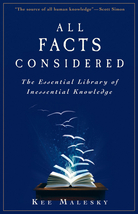Interesting profile of NPR’s longest-serving librarian (over twenty years) who has fielded questions for NPR reporters, editors and hosts. She has compiled some of her favorite bits of “inessential knowledge” — such as which building did Elvis leave last? — in a new book, All Facts Considered.

All Facts Considered: The Essential Library Of Inessential Knowledge
By Kee Malesky, Hardcover, 288 pages, Wiley List price: $19.95
Check out these ‘odd queries’: during her two decades of service in the NPR reference library, reporters have asked Malesky to look up some fairly obscure, though fascinating pieces of information.
The first non-Native American to set foot in what is now Chicago?
That would be an African man from Haiti by the name of Jean Baptiste Point du Sable, whose trading post was the first permanent dwelling there. Chicago has since named a high school after him, which few residents can properly pronounce.
And how about the “the rockets’ red glare” referenced in the Star-Spangled Banner? Where exactly did the red glare come from?
The British army’s Congreve rockets, Malesky explains. They were effectively very large bottle rockets — the kind you might set off in your backyard on July 4 — but in the early 1800s, they were a novel development in weaponry.
And watermelons — fruit or vegetable?
Interesting profile of NPR’s longest-serving librarian (over twenty years) who has fielded questions for NPR reporters, editors and hosts. She has compiled some of her favorite bits of “inessential knowledge” — such as which building did Elvis leave last? — in a new book, All Facts Considered.

All Facts Considered: The Essential Library Of Inessential Knowledge
By Kee Malesky, Hardcover, 288 pages, Wiley List price: $19.95
Check out these ‘odd queries’: during her two decades of service in the NPR reference library, reporters have asked Malesky to look up some fairly obscure, though fascinating pieces of information.
The first non-Native American to set foot in what is now Chicago?
That would be an African man from Haiti by the name of Jean Baptiste Point du Sable, whose trading post was the first permanent dwelling there. Chicago has since named a high school after him, which few residents can properly pronounce.
And how about the “the rockets’ red glare” referenced in the Star-Spangled Banner? Where exactly did the red glare come from?
The British army’s Congreve rockets, Malesky explains. They were effectively very large bottle rockets — the kind you might set off in your backyard on July 4 — but in the early 1800s, they were a novel development in weaponry.
And watermelons — fruit or vegetable?
“Yes,” Malesky says with a laugh. “It’s both. Most of us would think of it as a fruit, but it can also be considered a vegetable because it’s in the same family as cucumbers and gourds.” (In fact, the state Legislature of Oklahoma recently declared that the watermelon would be the official state vegetable.)
Weekend Edition Saturday from NPR (audio available at noon).


Recent Comments